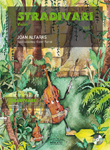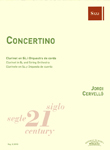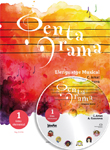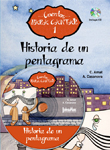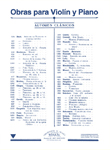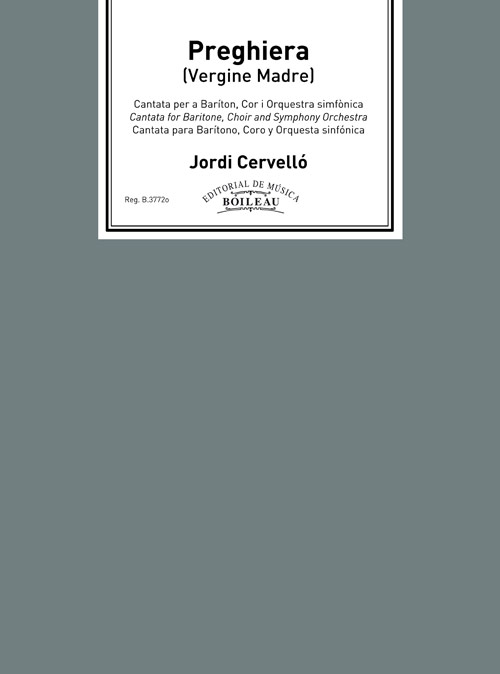WORKS
- Genre
-
Musical education
- Choir
- Counterpoint
- Dictation
- Direction
- Exam study manuals
- General music pedagogy
- Harmony
- Hearing
- Illustrations / Posters
- Improvisation / Sight reading
- Instrument methods
- Instrument pedagogy
- Instrumental study repertoire
- Instrumentation and orquestration
- Musical language
- Solfège
- Templates
- Theory and analysis
-
Incidental music
-
Lined paper
-
Flamenco
-
Religious music
-
Classical / contemporary
-
Modern music
-
Folk music / traditional
-
Musicology
-
Divulgation
-
Games and hobbies
-
Music therapy
-
Children / Youth
-
- Instruments
- Ensemble
- Difficulty level
- Period
- Genre
SOPORTE
Search
Find here: books, scores, composers, digital pieces, cd's
Best-selling works
Our classics

Newsletter
I wish to be informed of the news about your music
We have received your e-mail correctly
Multimedia
Preghiera (Vergine Madre)
Materiales de orquesta sinfónica en alquiler
Barítono, Coro mixto y Orquesta sinfónica
CERVELLÓ, JordiCERVELLÓ, JordiCERVELLÓ, JordiReg.: B.3772o
- Ensemble: Symphonic orchestra: With voice/choir.
Choir: With accompaniment; Mixt; With soloist(s). - Genres: Classical / contemporary: Choir; Chamber; Symphonic.
- Lyric author: ALIGHIERI, Dante
- Language: Italiano
- Product format: Partitura + particellas
- Difficulty level: Advanced-superior
- Period: 2nd half S. XX - XXI
- Publishing house: Editorial Boileau
- Collection: Siglo XXI
- Measure: 29,70 x 21,00 cm
- Lenght: 22''
- ISMN: 979-0-3503-3524-2
- Available in digital: No
- Available for rent: Yes
Solo: Bar
Mixed choir
2 0 3[1.2.bcl] 2 — 2 0 0 0 — tmp — cel — str
Cuerdas: 6,5,4,3,2
THE PARTS FOR CHOIR ARE SOLD SEPARATELY
In the cantata Preghiera I use twenty-one verses (the first three tercets) of the thirty-nine that make up the prayer in Dante’s Canto XXXIII. It is a cantata for baritone soloist, choir and symphony orchestra.
It starts with a delicate and mysterious introduction by the orchestra until the baritone soloist makes his appearance with the words “Vergine madre...“, always within a soft and melodic mood. The chorus comes out pianissimo, with the only backdrop of the low strings (violas, cellos and basses). Baritone and chorus embark in a dialog until they reach a poco allegretto in which the orchestra lifts up the pace. A few short transition tempos give way to an impressionistic mosso. Ever stronger triplet figurations fill the stave, further enlivening the pace until it reaches a majestic tutti. The baritone comes in then, solo, in an expressive pianissimo with the words “in te criatura è in te bontate”, leading to a delicate finale. The celesta comes in with its pristine sound and the orchestra fades into a high register.
The text is an exaltation of women, as conceived by Dolce stil novo, the literary movement to which Dante belongs to. It is the figure of a sublimated woman who becomes a source of poetic and spiritual inspiration. Thus was brilliantly expressed by Dante in his renowned sonnet dedicated to Beatrice, “Vita Nova”: Tanto gentile e tanto onesta pare. Virgin Mary is the woman par excellence, the redeeming woman, ever present in God’s thoughts. Rather than a religious or sacred text, Bernardo’s prayer is a genuine expression of mystic love to the one who foregathers every virtue a creature might possess, she who is the only and true bridge between men and God. The spirituality of the text has led me into a personally unprecedented vocal and instrumental treatment, since it has forced me to embark in a thorough research on timbre and absence of color.
Jordi Cervelló

